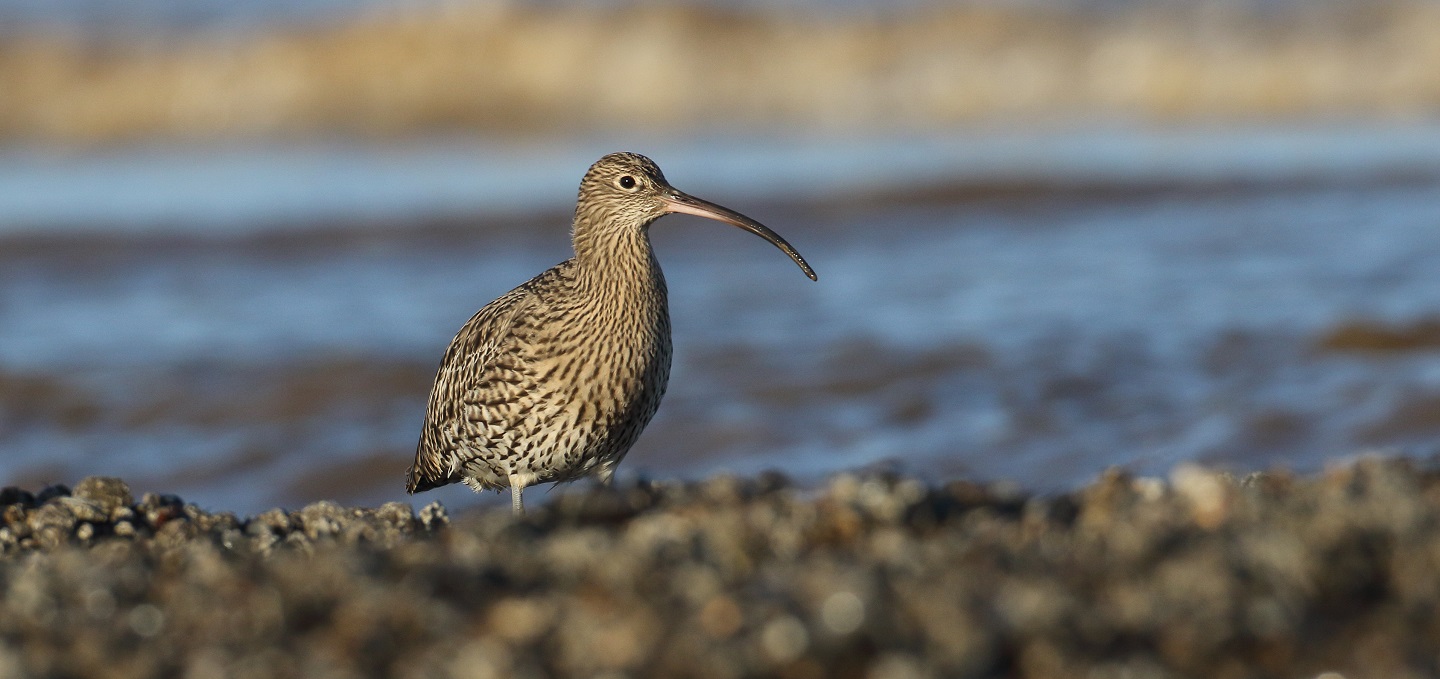New study explores effects of climate change on coastal bird habitats

Curlew. Credit: Liz Cutting / British Trust for Ornithology
18 February 2020
The effects of climate change on the habitats of two species of coastal bird in Wales and Ireland are set to be explored in a new €2.6m research project involving researchers from Aberystwyth University.
The study will look at how the habitats of the curlew and the Greenland white-fronted goose might be affected by changes in the climate and what mitigative practices can be put in place by land and site managers.
Surveys of the open mud, sand flats, grasslands and marsh vegetation foraged by curlews and Greenland white-fronted geese will highlight vulnerable areas along Wales-Ireland coastlines, bordering the Irish Sea and Cardigan Bay.
The findings will be used to develop an online platform and tools to help landowners, farmers, policy-makers and residents adapt to and manage the impacts of climate change on the local region.
The ECHOES project has been awarded funding of €2,687,579 from the European Regional Development Fund as part of the INTERREG Ireland-Wales programme.
It will bring researchers from Aberystwyth University and University College Cork, together with partners Compass Informatics, the British Trust for Ornithology, and Geo Smart Decisions.
Dr Peter Dennis, ECHOES team lead within Aberystwyth University said: "We know that the number of coastal birds in Wales has decreased dramatically over recent decades. We welcome this opportunity to address this concern through trans-disciplinary, collaborative research with partners around the Irish Sea.
“The synergy and innovative methods of ECHOES research and public engagement will augment the established conservation partnerships in Wales and Ireland whose remit is to manage, monitor and protect important bird habitats and ECHOES will increase momentum in everyone's determination to recover Greenland white-fronted goose and curlew populations.
“Importantly, the appreciation gained of impending effects of global warming on tidal ranges and loss of coastal land is not just about conservation of these wild birds. It is emblematic of direct threats to people, whose livelihoods and quality of life depend on the same coastal ecosystem. The projections of coastal squeeze from ECHOES and collaboration with organisations involved in gathering and storing environmental data will enable those communities to anticipate and adapt to those changes.”
ECHOES is one of two major research projects involving Aberystwyth and Cork universities to be awarded funding by the INTERREG Ireland-Wales programme in February 2020.
Announcing the funding, Counsel General and Brexit Minister Jeremy Miles, who is responsible for EU funds in Wales, said: “This is a great project which handles the global issue of climate change in an imaginative and creative way.
“Welsh Government has a fantastic track record for supporting major programmes working across borders on issues like this. Our team work with Ireland through the European Territorial Co-operation (ETC) programme is valuable and essential, which is why it’s so important that we’re able to continue to invest funds like this in the regions that need it most.”
Crona Hodges, ECHOES Operation Manager from Wales-based Geo Smart Decisions said: “The ECHOES project will investigate key data gaps and apply innovative approaches in the area of habitat mapping, climate change modelling and species distribution modelling at areas of sensitive coastal habitats.
“We will develop open source mapping tools to assist in management planning and decision-making and apply expertise from both Ireland and Wales in satellite Earth Observation to do so. ECHOES will ultimately result in a greater awareness and understanding of the impacts of climate change, amongst coastal communities and stakeholders on both sides of the Irish sea, and the associated options to mitigate for and adapt to those changes.”
A spokesperson for the British Trust for Ornithology (BTO) said: "This is an exciting and challenging project to be involved in. BTO is known for our class-leading bird research, but something we look forward to is helping to build trust and understanding amongst our partners and project stakeholders, as we all bring ECHOES from concept to the real world."
Operational work on this 3.5 year project starts in February 2020.




